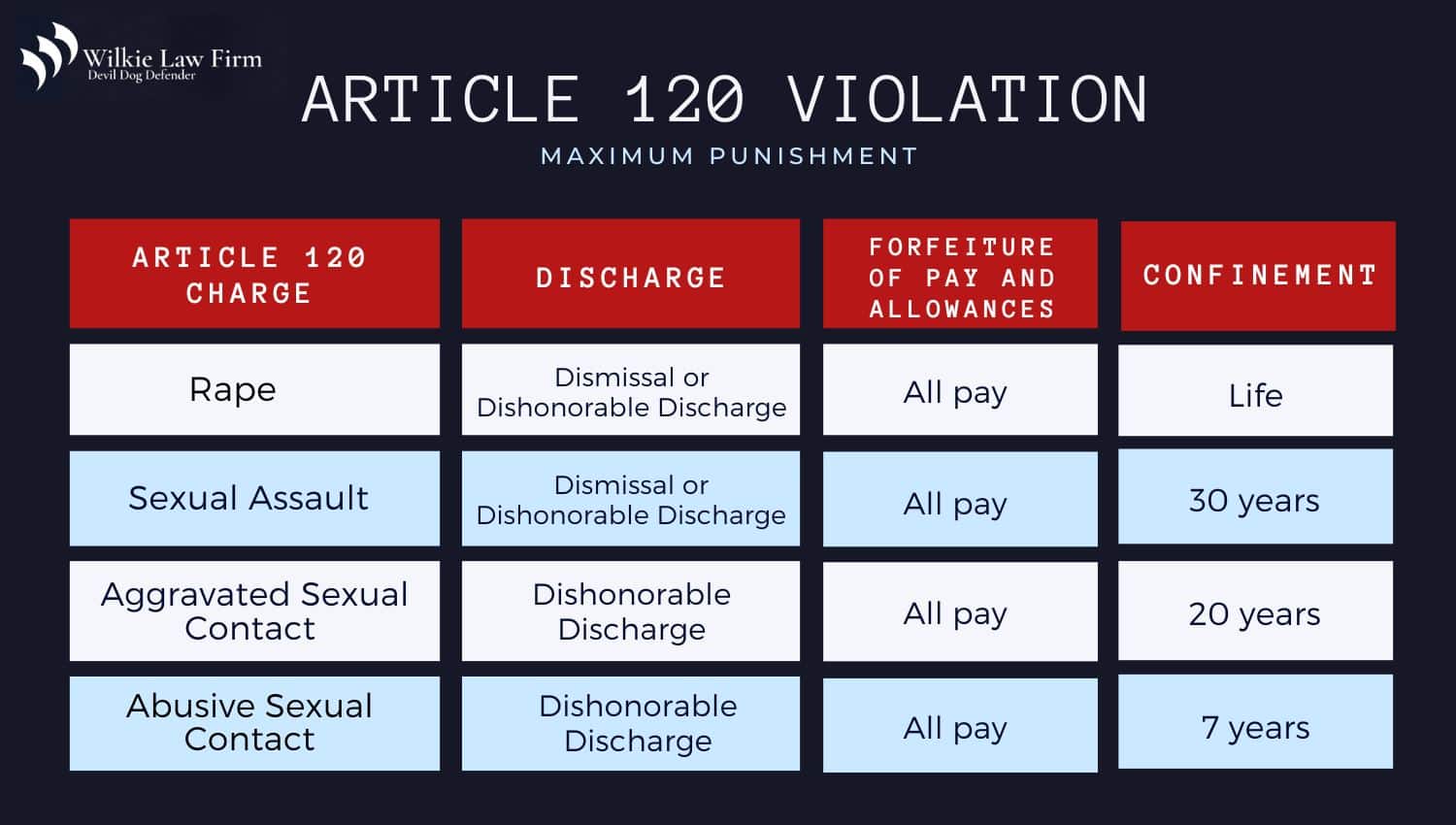UCMJ Article 120
Private Military Counsel for UCMJ Sexual Assault Charges
Home » UCMJ Article 120
Military Counsel
UCMJ Articles
UCMJ Article 120 – Rape and Sexual Assault
Table of Contents
Members of the armed forces within the United States military are governed by a unique set of statutory laws that differ from those governing the rest of civilian society. This code of laws is known as the Uniform Code of Military Justice, also referred to as the UCMJ Articles.
The punitive articles of the UCMJ are expansive and cover a wide variety of criminal actions for members of the armed forces. Some of these actions are military-specific, meaning you won’t find laws for them in the civilian world. This includes things such as Failure to Report and Conduct Unbecoming an Officer, for example. Others, such as violent crimes and abusive sexual contact, can be found in both state and federal legislation as well as within military law.
Below, experienced North Carolina military defense attorney Aden Wilkie of the The Wilkie Law Group explains the charges surrounding rape and sexual assault in the military, as they are defined by Article 120 of the UCMJ.

What is Article 120 of the UCMJ?
UCMJ Article 120 covers the criminal offenses of rape and sexual assault generally. Sexual offenses against children can be found in Article 120(b), and other types of sexual misconduct can be found in Article 120(c). Under 10. U.S.C. 920, any person subject to this chapter who knowingly violates it will be punished as directed by a court-martial.
Exact Text of Statute
(a) RAPE – Any person subject to this chapter who commits a sexual act upon another person by–
(1) Using unlawful force against that other person;
(2) Using force causing or likely to cause death or grievous bodily harm to any person;
(3) Threatening or placing that other person in fear that any person will be subjected to death, grievous bodily harm, or kidnapping;
(4) First rendering that other person unconscious; or
(5) Administering to that other person by force or threat of force, or without the knowledge or consent of that person, a drug, intoxicant, or other similar substance and thereby substantially impairing the ability of that other person to appraise or control conduct;
is guilty of rape and shall be punished as a court-martial may direct.
(b) SEXUAL ASSAULT – Any person subject to this chapter who–
(1) Commits a sexual act upon another person by–
(i) threatening or placing that other person in fear;
(ii) making a fraudulent representation that the sexual act serves a professional purpose; or
(iii) inducing a belief by any artifice, pretense, or concealment that the person is another person;
(2) Commits a sexual act upon another person–
(i) without the consent of the other person; or
(ii) when the person knows or reasonably should know that the other person is asleep, unconscious, or otherwise unaward that the sexual act is occurring;
(3) Commits a sexual act upon another person when the other person is incapable of consenting to the sexual act due to–
(i) impairment by any drug, intoxicant, or other similar substance, and that condition is known or reasonably should be known by the person; or
(ii) a mental disease or defect, or physical disability, and that condition is known or reasonably should be known by the person;
is guilty of sexual assault and shall be punished as a court-martial may direct.
(c) AGGRAVATED SEXUAL CONTACT – Any person subject to this chapter who commits or causes sexual contact upon or by another person, if to do so would violate subsection (a) (rape) had the sexual contact been a sexual act, is guilty of aggravated sexual contact and shall be punished as a court-martial may direct.
(d) ABUSIVE SEXUAL CONTACT – Any person subject to this chapter who commits or causes sexual contact upon or by another person, if to do so would violate subsection (b) (sexual assault) had the sexual contact been a sexual act, is guilty of abusive sexual contact and shall be punished as a court-martial may direct.
Definitions
A “sexual act” includes:
- The penetration, however slight, of the penis into the vulva or anus or mouth;
- Contact between the mouth and the penis, vulva, scrotum, or anus; or
- The penetration, however slight, of the vulva or penis or anus of another by any part of the body or any object, with an intent to abuse, humiliate, harass, or degrade any person or to arouse or gratify the sexual desire of any person.
“Sexual contact” means touching or causing another person to touch the vulva, penis, scrotum, anus, groin, breast, inner thigh, or buttocks with the intent to abuse, humiliate, harass, or degrade any person or to arouse or gratify the sexual desire of any person. This can be accomplished by any body part and can be done directly or through clothing.
The term “grievous bodily harm” essentially means severe bodily injuries, including:
- Fractured or dislocated bones;
- Deep cuts;
- Torn members of the body;
- Serious damage to internal organs;
- Or other severe bodily injuries
To employ “force” means:
- Using a weapon;
- Using such physical strength or violence to overcome, restrain, or injure a person; or
- Inflicting physical harm sufficient to coerce or compel submission by the victim.
Whereas to use “unlawful force” means to do so without legal justification.
“Consent” implies a freely given agreement to the conduct by a competent person. This means the person involved was not sleeping, unconscious, inebriated, or otherwise incompetent at the time of the alleged offense. A lack of verbal or physical resistance does not constitute consent, nor does a previous dating or sexual relationship.
Elements of Article 120 UCMJ
By definition, the elements that are required for a rape charge and an aggravated sexual contact charge under Article 120 include:
- Unlawful force
- Force causing or likely to cause death or serious bodily injury
- Threats or fear of death, grievous bodily harm, or kidnapping
- First rendering the alleged victim unconscious
- Administering a drug, intoxicant, or other similar substance
The elements required for both a sexual assault charge and an abusive sexual contact charge under Article 120 of the UCMJ include:
- Threats or causing reasonable fear in the alleged victim
- Fraudulent representation
- Artifice, pretense, or concealment
- No consent
- The alleged victim being asleep, unconscious, or otherwise unaware
- Inability to consent
Though the elements required to prove these charges are the same for both a rape + aggravated sexual contact charge and a sexual assault + abusive sexual contact charge, the charges themselves depend on whether it was a nonconsensual sexual act or nonconsensual sexual contact that took place. As highlighted in the definitions above, a “sexual act” entails sexual intercourse, such as the penetration of the mouth, anus, or vulva, while “sexual contact” refers to sexual touching.
What are the Penalties for an Article 120 UCMJ Charge?
Service members convicted of rape, sexual assault, or abusive or aggravated sexual assault face extremely harsh consequences. As prescribed by the Manual for Courts-Martial, the maximum punishment for the different charges under Article 120 are as follows:
Maximum Punishment for Rape
Sentenced to confinement for life (with no possibility of parole) and forfeiture of all pay and allowances, with a mandatory minimum sentence of dismissal or dishonorable discharge.
Maximum Punishment for Sexual Assault
Forfeiture of all pay and allowances and confinement for 30 years, with a mandatory minimum of dismissal or dishonorable discharge.
Maximum Punishment for Aggravated Sexual Contact
Confinement for up to 20 years, forfeiture of all pay and allowances, and a dishonorable discharge.
Maximum Punishment for Abusive Sexual Contact
Up to 7 years confinement, forfeiture of all pay and allowances, and a dishonorable discharge.
Possible Sex Offender Registration
A conviction for an offense under this Article of the UCMJ could result in a qualifying conviction on the Sex Offender List within the State in which you reside. That could also mean for the rest of your life you would have to contend with the consequences of being on such a list.
North Carolina Defense Attorney For Military Sexual Assault Cases
As you can see, accused service members stand to lose a lot when they are faced with Article 120 UCMJ charges. Rape and sexual assault offenses are taken very seriously within the military legal system, and it is critical that those facing these charges obtain the help of an experienced military defense attorney. Doing so right away can ensure that the charges levied against you are fought aggressively from the very beginning of your case.
Aden Wilkie of The Wilkie Law Group practices both military defense and civilian criminal defense in Jacksonville and the surrounding areas. As a private military sexual assault defense attorney, he is able to consider your best interests above all else, with no threat to his own career or chain of command. He is prepared to use his extensive legal knowledge, resources, skills, and decades of experience to provide a strong defense on your behalf.
Located in Jacksonville, NC, Aden Wilkie services the armed forces at Camp Lejeune and Fort Bragg as well as other bases, camps, stations, and posts across the nation. Call 910-333-9626 today for a consultation or complete our online intake form to learn more.
Contact an Article 120 Defense Attorney
It is vital to use the knowledge of a seasoned attorney to organize and prioritize the material to present to the command. Call The Wilkie Law Group at 910-333-9626 to arrange your consultation.





